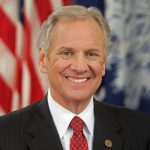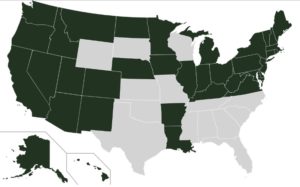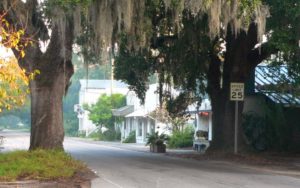INSIDE ISSUE 18.30 | JULY 26, 2019
 NEWS: Hundreds in S.C. died without Medicaid expansion, experts say
NEWS: Hundreds in S.C. died without Medicaid expansion, experts say
NEWS BRIEFS: Sales tax holiday could be last, common-law marriage, more
COMMENTARY, Brack: Give Caslen a chance but change board governance
SPOTLIGHT: ACLU of South Carolina
FEEDBACK: What does Sanford have to lose?
MYSTERY PHOTO: Odd buildings on the water
S.C. ENCYCLOPEDIA: Santee National Wildlife Refuge
BIG STORY: Hundreds in S.C. died without Medicaid expansion, experts say
By Lindsay Street, Statehouse correspondent | Nearly one in 10 older and poor S.C. residents who died in the last five years could be alive today had they had access to care, a new study found.

After reviewing the federal study, Christian Soura, who served as the state’s former Medicaid program head, this week told Statehouse Report that “several hundred” people likely died because the state did not expand Medicaid.
Soura, who is now vice president of policy and finance at S.C. Hospital Association, said the study noted “health care amenable” causes of death — causes that are largely preventable with access to care — among aging and low-income people in states without expanded Medicaid.
“This study reaffirms what hospitals already knew: access to coverage means access to care,” Soura said. “This study is another study that falls in line with the last several years of research, which is that Medicaid expansion keeps people alive and keeps people healthier.”
Report finds 15,600 preventable deaths nationwide
A working paper from the National Bureau of Economic Research found that, nationwide, 15,600 deaths could have been prevented if all states had adopted Medicaid expansion in 2014. Among individuals ages 55 to 64 in households earning less than 138 percent of the poverty level (such as a four-person household making less than $25,100 per year), there was a 9.3 percent reduction in death rates for states that expanded Medicaid.
State-specific data is not available because, according to a report author, the numbers haven’t been teased out state-by-state.
“I would like to provide state level estimates in the future (since I have had many requests for them) but will probably not have a chance to until some time next week,” University of Michigan assistant professor Sarah Miller told Statehouse Report on Wednesday.
South Carolina low-income earner advocate Sue Berkowitz said many of the deaths likely came from the state.

“It’s absolutely not surprising to see people are dying for things if they had preventive medicine and got the care up front they could not only avoid death but probably live more productive lives,” the director for S.C. Appleseed Legal Justice Center said.
Released this month, the paper is a large-scale federal survey of data linked to administrative death records.
In states that first adopt Medicaid expansion, the survey found a first-year decline in annual mortality among those older and poor of 6.4 percent, but it grows year over year to nearly one in 10 fewer deaths. In the entire population, the death rate in states with expanded Medicaid is 0.13 percent lower.
“This highlights an ongoing cost to non-adoption that should be relevant to both state policymakers and their constituents,” the report states.
Two governors promised to veto expansion
South Carolina is one of 14 states that has not adopted the largely federally funded Medicaid expansion provided by the 2010 Affordable Care Act (ACA) — a move directed by two successive Republican governors, both of whom promised vetoes.
In a 2018 Statehouse Report story, a governor’s office spokesman reiterated Gov. Henry McMaster’s position:

“Under no circumstances will Governor McMaster approve of expanding Medicaid in South Carolina.” The office did not respond to a request for an updated comment for this story.
Democratic lawmakers have put forward doomed measures over the years, but they have been unable to sway the Republican-controlled legislature. A House bill filed this year sought to bring the question of expansion to a voter referendum. It has stalled in committee.
“We have a moral obligation to our citizens to, first and foremost, not to allow people to die because of political reasons,” House Minority Leader Todd Rutherford of Richland said.
The status of Medicaid in S.C.
After a 2012 Supreme Court ruling that allowed states to reject expansion, Republican Gov. Nikki Haley declared the state would not expand Medicaid on her watch. McMaster has followed in her footsteps.
- A 2018 report found that if South Carolina expanded Medicaid, its uninsured population would drop from 660,000 to 466,000. Read more.
While the federal share of Medicaid has typically averaged about 57 percent nationwide, under the ACA, states will be reimbursed 90 percent in 2020. When the expansion first started, the federal government picked up 100 percent of the tab but that has been declining since. However, it is expected to remain at 90 percent, according to government documents.
But, in its own way, South Carolina has expanded Medicaid’s reach and plans to do more.
A Post and Courier analysis from earlier this year, found that the state has seen a 32 percent budget increase to Medicaid in the last eight years, with enrollment growing by more than 260,000 people.
Over the past year, the state also has sought a federal waiver that would allow it to impose work requirements on Medicaid beneficiaries. It was formally submitted this June (see document here). Some have warned that, should it be approved, thousands could lose vital benefits.
But more people could gain coverage. The waiver includes two provisions that coverage to low-income people without “expanding Medicaid.” The first would expand eligibility for the Children’s Health Insurance Program, and the second would expand coverage for low-income women beyond pregnancy until the child’s first birthday.
“Political leaders in this state are taking a look at the populations who need help the most and trying to connect those people to some form of coverage,” Soura said. But, he added, “it’s clear there is more we could do to reduce the uninsured rate and more we could do to reduce rates of mortality of low income older adults.”
More states adopting expansion

Eleven states that initially balked at Medicaid expansion have since increased their Medicaid recipients, bringing the total to 36 states, according to Kaiser Family Foundation.
“If you look back over the last several years the number of states that do Medicaid expansion has continued to increase,” Soura said. “There’s evidence in South Carolina and the remaining non-expansion states that people on both sides of the aisle are looking at what can be done.”
Berkowitz said expanding Medicaid has support in the state and in the legislature, but it is quashed by McMaster and other Republican leaders.
Leading House and Senate Republicans did not return requests for comments on the impacts of not expanding Medicaid.
“Democrats have tried everything we can to try to make it happen,” Rutherford said. “We don’t understand what the opposition is relying on at this point to continue to oppose it.”
- Have a comment? Send to: feedback@statehousereport.com
NEWS BRIEFS
Sales tax holiday could be last, common-law marriage, more
By Lindsay Street, Statehouse correspondent | If House Republicans have their way, the three-day state sales tax holiday that starts Aug. 2 may be the last for South Carolina.
![]() Called “poor tax policy” by the Tax Foundation in a new report, the state’s sales tax holiday is one of 16 being held across the country in the weeks ticking down to back-to-school.
Called “poor tax policy” by the Tax Foundation in a new report, the state’s sales tax holiday is one of 16 being held across the country in the weeks ticking down to back-to-school.
In recent years, the S.C. House Tax Policy Review Committee has held hearings and pushed tax-related legislation, including a bill that remove exemptions and lower the state’s sales tax. The bill is sponsored by House Speaker Pro Tempore Tommy Pope and a slew of other Republicans. Democratic Reps. Roger K. Kirby of Lake City and Mandy Powers-Norrell of Lancaster have also signed onto the bill.
The committee has addressed the annual sales tax holiday in passing, but it has never been the focus of any in-depth conversation, according to staff. But should exemptions be removed, it’s likely the state’s annual tax holiday could be axed, staff said.
The Tax Foundation found sales tax holidays “do not promote economic growth or significantly increase consumer purchases.” The report said consumers simply shift the timing of purchases and that some retailers raise prices during the holiday, reducing consumer savings.
“Sales tax holidays create complexities for tax code compliance, efficient labor allocation, and inventory management. However, free advertising for what is effectively a paltry 4 to 7 percent discount leads many larger businesses to lobby for the holidays,” the report said.
In other news,
No more common-law marriages. The S.C. Supreme Court ruled this week to abolish the state’s common-law marriage, joining other states moving to remove the law from the books. The ruling doesn’t affect any current marriages where couples who live together for a long time can be considered married without a license, however. Read more.
College governing board diversity follow-up. In a conversation about higher education governing board diversity with Statehouse Report this week, Senate President Harvey Peeler, R-Gaffney, said, “I’m not down on old, white men — I am one — but I understand the importance of diversity.” Peeler said he is working Hopkins Sen. Darrell Jackson, a Democrat, on helping bring more diversity to governing boards. Read our story from last week about how the boards are mostly white men.
- See Andy Brack’s column this week on the need for diversity on college boards.
Gaming rears its head. Weeks after an S.C.-based Indian nation said it would open a casino in North Carolina due to the state’s reticence on gambling, a forum convened in Horry County touting gambling benefits. The Palmetto Forum for Gaming Studies said increasing gambling’s presence in the state could be an economic stimulant that provides the state revenue for education and infrastructure. Read more.
Harris cites S.C. unsafe water. U.S. Sen. Kamala Harris, D-California, introduced the “Water Justice Act” this week in Washington, citing 360,000 South Carolinians receiving lead-tainted drinking water. The bill by the 2020 Democratic presidential candidate pledges $250 billion for clean and safe drinking water programs and would prioritize high-risk communities and schools, and $50 billion will go towards communities and schools with contaminated water to test for water quality and remedy toxic infrastructure.
2020 candidate calendar
 Throughout the campaign season, we are working to keep South Carolina informed of candidate events in the state. Have an event you want us to know about? Email us at 2020news@statehousereport.com.
Throughout the campaign season, we are working to keep South Carolina informed of candidate events in the state. Have an event you want us to know about? Email us at 2020news@statehousereport.com.
Williamson heads to the coast. Advice author and Democratic candidate Marianna Williamson is visiting the South Carolina coast this weekend. She has an event scheduled 5:30 p.m. July 26 at Unity Myrtle Beach in Surfside, and another event scheduled 4 p.m. July 27 at Unity Church in Beaufort.
Ryan visits the Upstate. U.S. Rep. Tim Ryan of Ohio will be in South Carolina this weekend with a visit to Laurel Creek Community Center 4 p.m. July 26 in Greenville, dinner at 8:30 p.m. July 26 at Halls Chophouse in Greenville, a meeting with Greenville County Democratic Party 8:30 a.m. July 27 at Upstate Circle of Friends in Greenville, canvassing in with S.C. candidate Carrie Counton at 10 a.m. July 27 in Greenville, lunch 11:45 a.m. July 27 at Carolina Drive Inn in Greenville, and touring the Regenesis Community Development Corp. 1:30 p.m. July 27 in Spartanburg.
De Blasio’s wife, son visit Sumter. New York Mayor Bill de Blasio’s wife Chirlane McCray and Dante de Blasio will have lunch with the Sumter Democratic Party noon July 27 at Jeffrey Lampkin’s Country Boy Kitchen. Visit here to RSVP.
Surrogates. See other upcoming events with Democratic candidates’ surrogates here, including actor Danny Glover for U.S. Sen. Bernie Sanders of Vermont, and former Florida attorney general candidate Sean Shaw for South Bend Mayor Pete Buttigieg.
Looking ahead
Click below for other items coming up in the Statehouse:
Find any bill
- House bills
- Senate bills
- Have a comment? Send to: feedback@statehousereport.com
BRACK: Give Caslen a chance but change board governance

By Andy Brack, editor and publisher | The selection of retired three-star Gen. Robert Caslen as the new president of the University of South Carolina system is a raw wound than needs to heal in two ways.
 First, a vocal minority upset by the process and choice still feels the sting of the wound. That’s understandable. They lost. But now it’s time to move on and give the new president, who starts Aug. 1, a chance. It’s up to him to put salve on the wound, pull the university’s campuses together and help them move forward.
First, a vocal minority upset by the process and choice still feels the sting of the wound. That’s understandable. They lost. But now it’s time to move on and give the new president, who starts Aug. 1, a chance. It’s up to him to put salve on the wound, pull the university’s campuses together and help them move forward.
Harris Pastides, the university’s president until the end of July, already has called for healing. “There is no doubt that the last few months have been difficult and have strained relations within our Carolina family,” Pastides told The State newspaper. “From time to time that happens in every family … Let’s pledge to work together to begin the healing and reconciliation as we seek to move our great University forward.”
Second, and perhaps more critical, is the whole procedural mess surrounding Caslen’s selection — the gubernatorial interference, the protests, the board dysfunction and the secrecy. Fixing this is easier — and harder at the same time.
The easy part is for university governing boards to be open and transparent in selection of leaders. What’s harder is to change the composition of the people on these boards so there is more transparency and diversity of viewpoints. Changing who sits on university boards is controlled by the legislature, which many would agree is not a body that hums like a finely-tuned machine or particularly worries about diversity. It is, after generations, still mostly white and male. And it is messy, political and slow to embrace change.
As outlined last week by Statehouse Report’s Lindsay Street, the legislature’s appointments to university governing boards has created educational fiefdoms mostly in its own image.
“Of South Carolina’s 161 public university board members, including ex-officio members, 39 were female and 25 were black,” Street reported. “The University of South Carolina … has a governing board that is 88.9 percent male and 94.1 percent white.” Furthermore, the review of board members revealed no board members who were Latino, Asian or of Native American ancestry.
There are, of course, exceptions among the state’s 10 governing boards. Two-thirds of trustees at S.C. State University, a historically black institution, are black, but it also is tied with USC for having the lowest percentage of female trustees. Governing boards at Winthrop and Lander universities look more like the rest of the state. But white males rule the roost elsewhere.
A bipartisan bill in the state Senate seeks to make the USC board less unwieldy by cutting its size from 20 to 11. But that’s just another bandage on a process that doesn’t address the lack of diversity on all university boards.
The General Assembly needs to make diversity a priority on all state-appointed boards, from universities to agencies, to better reflect the opinions and values of people throughout the state. If white males — a minority in our state — continue to be a majority when decisions are made, governance at all levels won’t benefit from broad ideas that can make things better for everyone.
Legislators need to use the fracas at USC in recent months as an incentive for better governance. They need to listen to what people are saying about the process and do something about it.
Similarly, now is the time for USC’s incoming president to do a lot of listening to bring students, faculty and staff together so they can flourish. The retired three-star general has had lots of success in the past, including five years leading West Point, a top-25 college.

o far, Caslen (“call me Bob”) seems to be off to a good start. He’s met with some students and faculty members. He’s read critical comments from the hiring process. He’s outlined a general, positive vision with statements like, “I do not believe in being average. A great university requires excellence. I will expect that in myself and I look forward to seeing that at our university.”
Let’s hope he keeps listening — and that lawmakers will take proactive steps to create better university board governance.
- Andy Brack’s new book, “We Can Do Better, South Carolina,” is now available in paperback via Amazon.
- Have a comment? Send to: feedback@statehousereport.com.
SPOTLIGHT: ACLU of South Carolina
 The public spiritedness of our underwriters allows us to bring Statehouse Report to you at no cost. This week’s spotlighted underwriter is the American Civil Liberties Union. The ACLU of South Carolina is dedicated to preserving the civil liberties enshrined in the U.S. Constitution and Bill of Rights. Through communications, lobbying and litigation, the ACLU of South Carolina works to preserve and enhance the rights of all citizens of South Carolina. Foremost among these rights are freedom of speech and religion, the right to equal treatment under law, and the right to privacy.
The public spiritedness of our underwriters allows us to bring Statehouse Report to you at no cost. This week’s spotlighted underwriter is the American Civil Liberties Union. The ACLU of South Carolina is dedicated to preserving the civil liberties enshrined in the U.S. Constitution and Bill of Rights. Through communications, lobbying and litigation, the ACLU of South Carolina works to preserve and enhance the rights of all citizens of South Carolina. Foremost among these rights are freedom of speech and religion, the right to equal treatment under law, and the right to privacy.
What does Sanford have to lose?
To the editor:
![]() agree Sanford should run. What else does he have to do with his time? And the more media attention he draws away from Trump the better.
agree Sanford should run. What else does he have to do with his time? And the more media attention he draws away from Trump the better.
Sure, some S.C. Dems might vote for him, but so what? This state isn’t going to go for any of the top Dems with hopes for next year. We can’t even elect Dems in most of our congressional districts.
But the more disruption Sanford can cause in Repub ranks the better. I could wish South Carolina would cast its electoral votes for Sanford. The fewer votes for Trump the better. My vote will go for whoever the Dem nominee is. But I’ll regretfully vote for some old fogie, no matter how many facelifts and hair transplants he has.
— Dan Ruck, Greenville, S.C.
Send us your thoughts … or rants
We love hearing from our readers and encourage you to share your opinions. But you’ve got to provide us with contact information so we can verify your letters. Letters to the editor are published weekly. We reserve the right to edit for length and clarity. Comments are limited to 250 words or less. Please include your name and contact information.
- Send your letters or comments to: feedback@statehousereport.com
Odd buildings on the water

Just about all of our Mystery Photos are somewhere in South Carolina. This one isn’t. It’s not even in the United States. Identify the community and what these odd buildings on the left are. Send your guess about the location of this photo to feedback@statehousereport.com. And don’t forget to include your name and the town in which you live.
Our previous Mystery Photo
 Our July 19 mystery, “Speed limit: 25 mph,” shows the quaint village of McClellanville in northern Charleston County.
Our July 19 mystery, “Speed limit: 25 mph,” shows the quaint village of McClellanville in northern Charleston County.
We were surprised that only a few readers guessed the location. Congratulations to Jay Altman of Columbia; Philip Cromer of Beaufort; George Graf of Palmyra, Va., Gwen Strickland of Marion and the Hartsville crew of Bill Segars and Don Clark (both of whom mentioned the good seafood at T.W. Graham’s, one of our favorites).
Graf provided a little more context, thanks to discoversouthcarolina.com: “McClellanville offers more than just the charms of a small historic town. Located at the edge of the Cape Romain National Wildlife Refuge, it serves as the gateway to one of the prettiest and most pristine estuaries on the Atlantic Coast. Surrounded by Francis Marion National Forest, the community also is close to miles of hiking, horseback riding and biking trails, creeks and rivers for fishing and kayaking, and a half-dozen campgrounds and recreation areas.”
- Send us a mystery: If you have a photo that you believe will stump readers, send it along (but make sure to tell us what it is because it may stump us too!) Send to: feedback@statehousereport.com and mark it as a photo submission. Thanks.
S.C. ENCYCLOPEDIA
HISTORY: Santee National Wildlife Refuge
S.C. Encyclopedia | Established in 1942, Santee National Wildlife Refuge (NWR) was created to alleviate the loss of natural waterfowl and wildlife habitat caused by the construction of hydroelectric projects on the Santee and Cooper Rivers. Management and protection are provided for 15,095 acres that stretch for eighteen miles along the northern shore of Lake Marion in Clarendon County.
The area includes more than ten thousand acres of open water and freshwater marsh along with mixed hardwoods and pines, croplands, old fields, ponds, and managed impoundments. Significant waterfowl concentrations winter on the refuge, as do other birds of interest. Santee Refuge overwinters the largest group of Canada geese belonging to the Southern James Bay population in South Carolina. With recorded observations of 296 species, the refuge is one of the best inland birding areas in the state.
Santee NWR includes four units, each with its own unique characteristics. The Bluff Unit is home to the Santee Indian Mound, which dates back more than 3,500 years. The mound is also the site of Fort Watson, which was an important British encampment during the Revolutionary War. Dingle Pond is home to a Carolina bay and provides unique habitat for several wetland species including alligators, wood ducks, mallards, great blue herons, and other wading and song birds. Pine Island provides protection and habitat for American alligators, numerous species of wading birds, and nesting bald eagles and is home to thousands of wintering ducks, geese, and swans. The Cuddo Unit includes mixed hardwood and pine woodlands, numerous freshwater impoundments and marshes, and several old-field and cropland sites. Bird life is abundant, as are alligators and many other native species.
Santee NWR promotes conservation and stewardship by providing wildlife-dependent recreational opportunities and offers environmental education programs. Interpretive exhibits in the visitors’ center provide an orientation to the refuge. Visitors can explore the refuge on several miles of hiking trails or on an auto drive. Fishing and hunting are permitted during designated seasons in accordance with special refuge regulations.
— Excerpted from an entry by Kay W. McCutcheon. This entry may not have been updated since 2006. To read more about this or 2,000 other entries about South Carolina, check out The South Carolina Encyclopedia, published in 2006 by USC Press. (Information used by permission.)
Available in paperbrack, err, paperback
Now you can get a copy of editor and publisher Andy Brack’s We Can Do Better, South Carolina! ($14.99) as a paperback.
The book of essays offers incisive commentaries by editor and publisher Andy Brack on the American South, the common good and interesting South Carolina leaders, such as former U.S. Sen. Fritz Hollings, civil rights advocate Septima Clark, former S.C. Gov. David Beasley and more. There also are discussions on civil rights struggles with which the Palmetto State continues to grapple. as well as commentaries on politics, governments, the hangovers of South Carolina’s past and her future opportunities.
We Can Do Better, South Carolina! is also available exclusively as a Kindle book for $7.99. Click here to purchase a Kindle copy.
- If you have a comment or question about the book, please let us know at: feedback@statehousereport.com.
ABOUT STATEHOUSE REPORT
Statehouse Report, founded in 2001 as a weekly legislative forecast that informs readers about what is going to happen in South Carolina politics and policy, is provided to you at no charge every Friday.
- Editor and publisher: Andy Brack, 843.670.3996
- Statehouse correspondent: Lindsay Street
More
- Mailing address: Send inquiries by mail to: P.O. Box 22261, Charleston, SC 29407
- Subscriptions are free: Click to subscribe.
- We hope you’ll keep receiving the great news and information from Statehouse Report, but if you need to unsubscribe, go to the bottom of the weekly email issue and follow the instructions.
- © 2019, Statehouse Report. All rights reserved.




Pingback: 7/26: Impact of not expanding Medicaid; Tax policy; Give Caslen a chance – Statehouse Report – Medicaid Articles